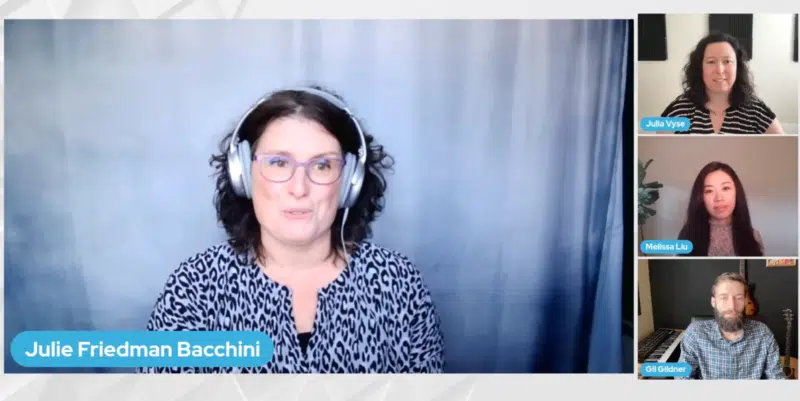Google Marketing Live 2023 made it clear that AI is going to change the role of digital marketing in a big way. At SMX Advanced, Julia Friedman, owner of PPC consultancy Neptune Moon, discussed how advertisers can both prepare for and thrive in the AI revolution, with fellow industry experts:
- Gil Gildner, co-founder of PPC agency Disco Sloth
- Julia Vyse, West Coast digital director for iProspect Canada
- Melissa Liu, associate director of California ad agency RPA.
The AI revolution has arrived – with huge perks!
The SMX panel was in agreement that AI is going to make life easier for digital marketers in many ways. Gill noted that smaller businesses in particular that perhaps do not have the budget to hire human contractors would benefit from using AI tools.
Liu also pointed out that AI will relieve advertisers from time-consuming tasks such as generating ad copy. However, she stressed that it was important for marketers to not become complacent: “As a search marketers, I now need to think about how I can shift my role to be more strategic. I also need to think about what new skills I need to learn to better myself.”
The role of digital marketers is changing
All three guest speakers as well as the panel’s host were in agreement that the role of PPC advertisers is evolving – and that it is a “concern” for the industry. Explaining how his agency is going to adapt to the AI revolution, Gill said:
- “We’re going to go super strategic. It’s inevitable that it soon wont matter as much what buttons we’re clicking. There will be a lot of strategy and tactics and, honestly, client education and shepherding that we’re going to have to do. It’s inevitable that our roles are going to change and it will be important to stay on top of that.”
Get the daily newsletter search marketers rely on.
Should marketers question their optimism around AI?
Vyse was hugely excited about the changes Google discussed for digital marketers. She also spoke about her appreciation for being told in advance about how the industry would be evolving.
- “It’s nice to get a bit of a head up as opposed to have something dropped on us in the middle of the year,” she joked.
However, Vyse added that while AI is going to help advertisers, the industry should also prepare itself for unexpected issues.
- “There’s a lot of optimism around AI, but perhaps that’s something we should question,” she added.
Google Marketing Live unveiled a number of new tools for digital marketers, such as Product Studio, which Gill noted would be hugely beneficial for small and medium-sized businesses:
- “Some smaller brands don’t have the budget to do professional photoshoots for every single product – even though it’s massively valuable. We see an uplift every time we have good media for a client whether it’s a TV commercial or product listing.
- “So Product Studio is huge for e-commerce agencies. It will allow smaller brands to have better creative control. I don’t think it’ll help bigger brands that much but definitely mid size to smaller brands.”
Concerns around AI generated content
After Google unveiled new tools to help marketers write ad copy, Liu admitted she was excited but keen to learn what the editorial quality would be.
- “Writing ad copy require a deep understanding of your customer and what your unique selling position is. I’m curious to see if AI will give me and my competitors similar copy or will AI copy be tailored to my unique brand?” she said.
Liu voiced her concerns over the loss of originality and a brand’s tone of voice if the industry relies too heavily on AI-generated copy. However, she stressed that it will fall on the shoulders of digital advertisers to to ensure this problem doesn’t impact their brands. Explaining how she intends to address this issue, she said:
- “One idea that resonates is quality of input and how I, as a search marketer, can better input into the system to differentiate myself against my competitors. Yes, our roles are changing, but how do we put that human touch to best guide AI to perform better for us?”

Issues around AI imagery
Liu was also excited about Google’s launch of AI tools that can create unique images. However, when she was watching the demonstration of the search engine’s new tools, she had some concerns:
- “There were automatically generated images using pictures taken from your website as well as stock photos. One concern I have is that if me and my competitor have very similar product offerings and want to communicate the same benefits, will AI give us similar stock images? Because that will pose a problem,” Liu said.
Exciting news for retail – not so much for finance
For digital marketers working on retail campaigns, Vyse pointed out that the AI generative properties and front-end user experience changes unveiled by Google are exciting news. She said:
- “I work with a lot of retail businesses and restaurants, so I’m interested in footfall traffic, and how people interact with their map. When you’re experiencing what is to get directions and go somewhere, such as a retailer who I support, I’m really interested in what that’s going to look like for customers.”
Discussing the new backend generative features, Vyse added:
- “All the stuff they’re doing to change how we build and measure campaigns is going to be great and not so great. For my retailers and restaurant clients, it’s going to be fantastic. Everything is going to be much simpler with a lot more thought leadership and strategy from us as opposed to button pressing. But on the other hand, for anyone who works in a highly regulated industry like finance, there might be some challenges.”
Searchers are changing their behaviours
After watching the Google Marketing Live discussion, Liu noted how the way searches are conducted online have also changed dramatically.
In 2011, she noted that consumers consulted 10 or more sources before making a purchases. Fast-forward to 2023, and people tend to consult just five sources online.
- “In a culture where we’re research obsessed, I’m surprised it’s dropped so much. I wonder if it’s because people are getting information fatigue of if we’re just getting much better at researching and so less sources are needed to make that decision. With AI becoming an integral part of our lives, I’m curious to see if that number will change in the next couple of years,” Liu said.
What’s next for Google Ads?
Gil said he expects the industry to change significantly in the near future:
- “I wouldn’t be surprised if Google Ads is entirely different in a year or two. There are always trends, but I was surprised at seeing all the tools Google is launching. I think it may actually be changing this time.”
Although he is anticipating huge changes to the industry, Gill stressed that as long as the experience is still good for both the searcher and the client, then the AI revolution will be positive. But there will undoubtedly be teething issues and the industry will simply need to adapt.
Related stories
New on Search Engine Land
https://searchengineland.com/google-marketing-live-smx-expert-reactions-428197


